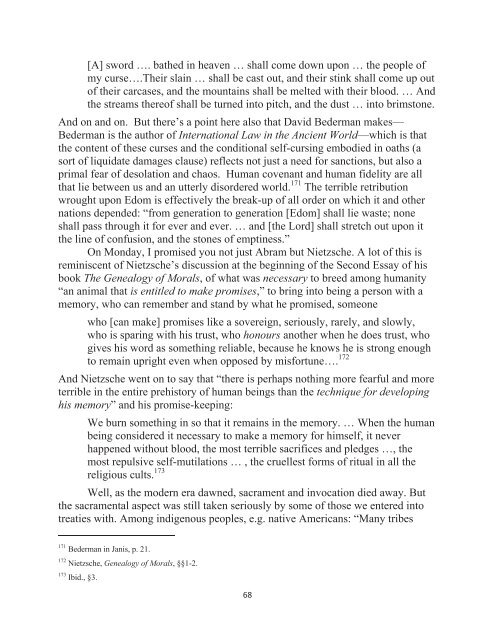International Legal Evangelism: Intelligence, Reconnaissance & Missions
International Legal Evangelism: Intelligence, Reconnaissance & Missions
International Legal Evangelism: Intelligence, Reconnaissance & Missions
Create successful ePaper yourself
Turn your PDF publications into a flip-book with our unique Google optimized e-Paper software.
[A] sword …. bathed in heaven … shall come down upon … the people of<br />
my curse….Their slain … shall be cast out, and their stink shall come up out<br />
of their carcases, and the mountains shall be melted with their blood. … And<br />
the streams thereof shall be turned into pitch, and the dust … into brimstone.<br />
And on and on. But there’s a point here also that David Bederman makes—<br />
Bederman is the author of <strong>International</strong> Law in the Ancient World—which is that<br />
the content of these curses and the conditional self-cursing embodied in oaths (a<br />
sort of liquidate damages clause) reflects not just a need for sanctions, but also a<br />
primal fear of desolation and chaos. Human covenant and human fidelity are all<br />
that lie between us and an utterly disordered world. 171 The terrible retribution<br />
wrought upon Edom is effectively the break-up of all order on which it and other<br />
nations depended: “from generation to generation [Edom] shall lie waste; none<br />
shall pass through it for ever and ever. … and [the Lord] shall stretch out upon it<br />
the line of confusion, and the stones of emptiness.”<br />
On Monday, I promised you not just Abram but Nietzsche. A lot of this is<br />
reminiscent of Nietzsche’s discussion at the beginning of the Second Essay of his<br />
book The Genealogy of Morals, of what was necessary to breed among humanity<br />
“an animal that is entitled to make promises,” to bring into being a person with a<br />
memory, who can remember and stand by what he promised, someone<br />
who [can make] promises like a sovereign, seriously, rarely, and slowly,<br />
who is sparing with his trust, who honours another when he does trust, who<br />
gives his word as something reliable, because he knows he is strong enough<br />
to remain upright even when opposed by misfortune…. 172<br />
And Nietzsche went on to say that “there is perhaps nothing more fearful and more<br />
terrible in the entire prehistory of human beings than the technique for developing<br />
his memory” and his promise-keeping:<br />
We burn something in so that it remains in the memory. … When the human<br />
being considered it necessary to make a memory for himself, it never<br />
happened without blood, the most terrible sacrifices and pledges …, the<br />
most repulsive self-mutilations … , the cruellest forms of ritual in all the<br />
religious cults. 173<br />
Well, as the modern era dawned, sacrament and invocation died away. But<br />
the sacramental aspect was still taken seriously by some of those we entered into<br />
treaties with. Among indigenous peoples, e.g. native Americans: “Many tribes<br />
<br />
171 Bederman in Janis, p. 21.<br />
172 Nietzsche, Genealogy of Morals, §§1-2.<br />
173 Ibid., §3.<br />
<br />
68

















